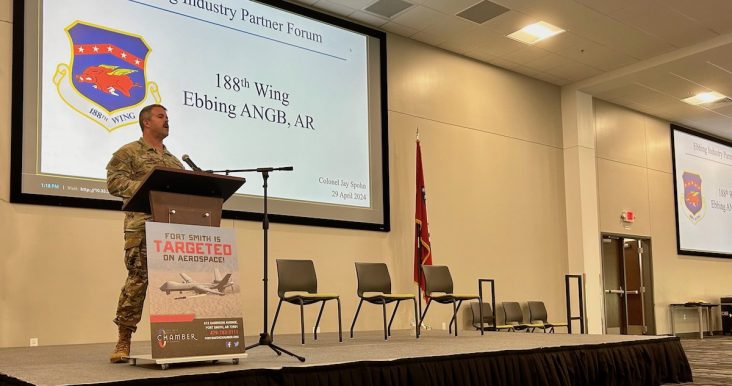Number of foreign military jets at Fort Smith could rise; basing cost up to $850 million
by April 30, 2024 5:24 pm 6,010 views

Col. Jay “Evil” Spohn, commander of the 188th Wing based at Ebbing Air National Guard Base in Fort Smith, on Monday (April 29) addresses attendees of a Fort Smith Regional Chamber of Commerce event.
The foreign military pilot training center in Fort Smith has yet to become operational or even see its first jet find a home in a hangar, but the number of planes could potentially rise, and the cost to establish the center is also up from initial estimates.
Rob Ator, a retired Air Force colonel and the Arkansas Economic Development Commission director of Military Affairs, said Monday (April 29) that efforts are underway to prepare Ebbing Air National Guard Base in Fort Smith to handle 48 fighter jets instead of the original 36.
Ebbing, home to the 188th Wing in Fort Smith and co-located with the Fort Smith Regional Airport, was selected in March by the U.S. Air Force to be the long-term pilot training center supporting F-16 and F-35 fighter planes purchased by Singapore, Switzerland, Poland, Germany, Finland and other countries participating in the Foreign Military Sales (FMS) program. Specifically, Singapore is expected to base 12 F-16s at Ebbing, with slots for 24 F-35s from the participating countries.
Ator made the news at a Fort Smith Regional Chamber of Commerce event held to connect businesses with civilian and military officials from the U.S. Air Force and U.S. Army Corps of Engineers who are managing construction and other activities involved in setting up the new training center.
BRICK AND MORTAR STAGE
“And now we’re at the stage for brick and mortar. And everyone here loves brick and mortar,” Chamber President and CEO Tim Allen told the almost 200 people gathered at the Peak Innovation Center in Fort Smith. “That’s why you’re here.”
Allen said the chamber is working to be “very intentional about the economic impact (of the base)” and to provide information to and get input from the businesses “certain to benefit” from the work to build the base and in providing ongoing services.
Initial estimates were that 1,500 military personnel and family members will be associated with the new center once it is fully operational. Initial cost estimates to renovate existing structures, build new facilities and make other changes ranged between $700 million and $800 million. But on Monday, the audience was told that the new estimate was up to $850 million.

Ator said if another 12 F-35s are given the green light to be based at Ebbing, the cost could rise by around $260 million.
‘EVIL’ CONFIDENCE
Lt. Col. Alex “Tuna” Turner, a training officer with the 33rd Fighter Wing at Eglin Air Force Base in Florida, said training at Ebbing will be unique because many NATO (North Atlantic Treaty Organization) partners flying the F-35 will learn to work together in the skies over Arkansas. He said the F-35s are a“leap forward in NATO’s Air Force interoperability” and a key part of the “strategic bulwark against Russian aggression in Europe.” The 33rd is the tenant at Ebbing managing the training center.
Turner also predicted the pilot training center would have a “stable” and “enduring mission” because of training needed by a growing number of U.S. allies who have or want to acquire the F-35.
He said much work will be needed to prep Ebbing for the new mission, but “the bones of that base are still good” because it previously housed manned flying missions – most recently with the F-16 and the A-10 Warthog.
Col. Jay “Evil” Spohn, commander of the 188th Wing based at Ebbing, told Monday’s audience he is confident the Fort Smith community and state officials will deliver on what is an atypical and aggressive schedule by the Air Force and other government agencies to get the base ready.
As an example, he said a recent electric line issue with Oklahoma City-based OG&E that was resolved in two weeks would likely have taken six months on any other Air Force base. Spohn said, “Our ability to leverage resources in the community” gives him confidence the base will be ready later this year when some of the first jets are set to arrive.
